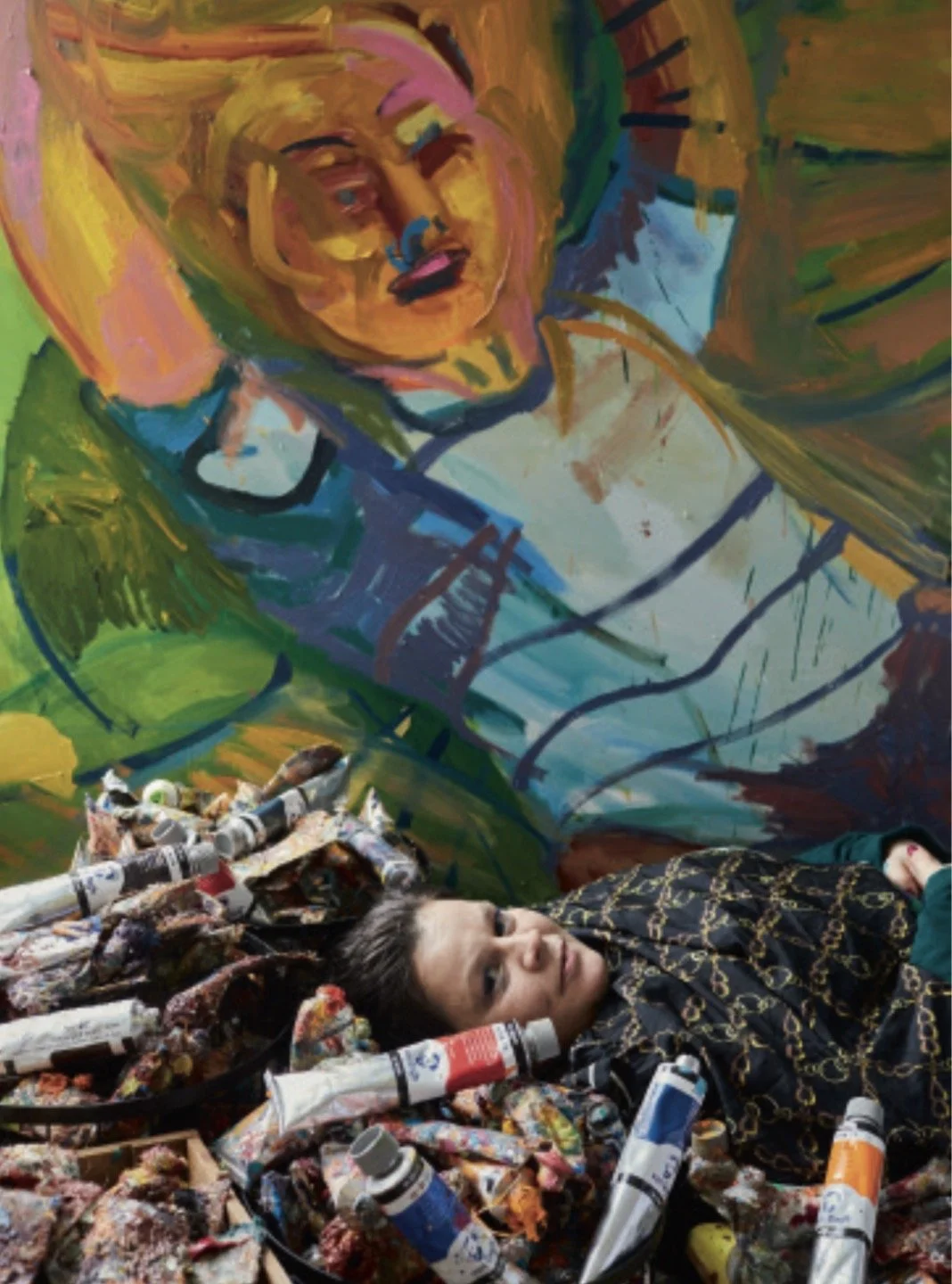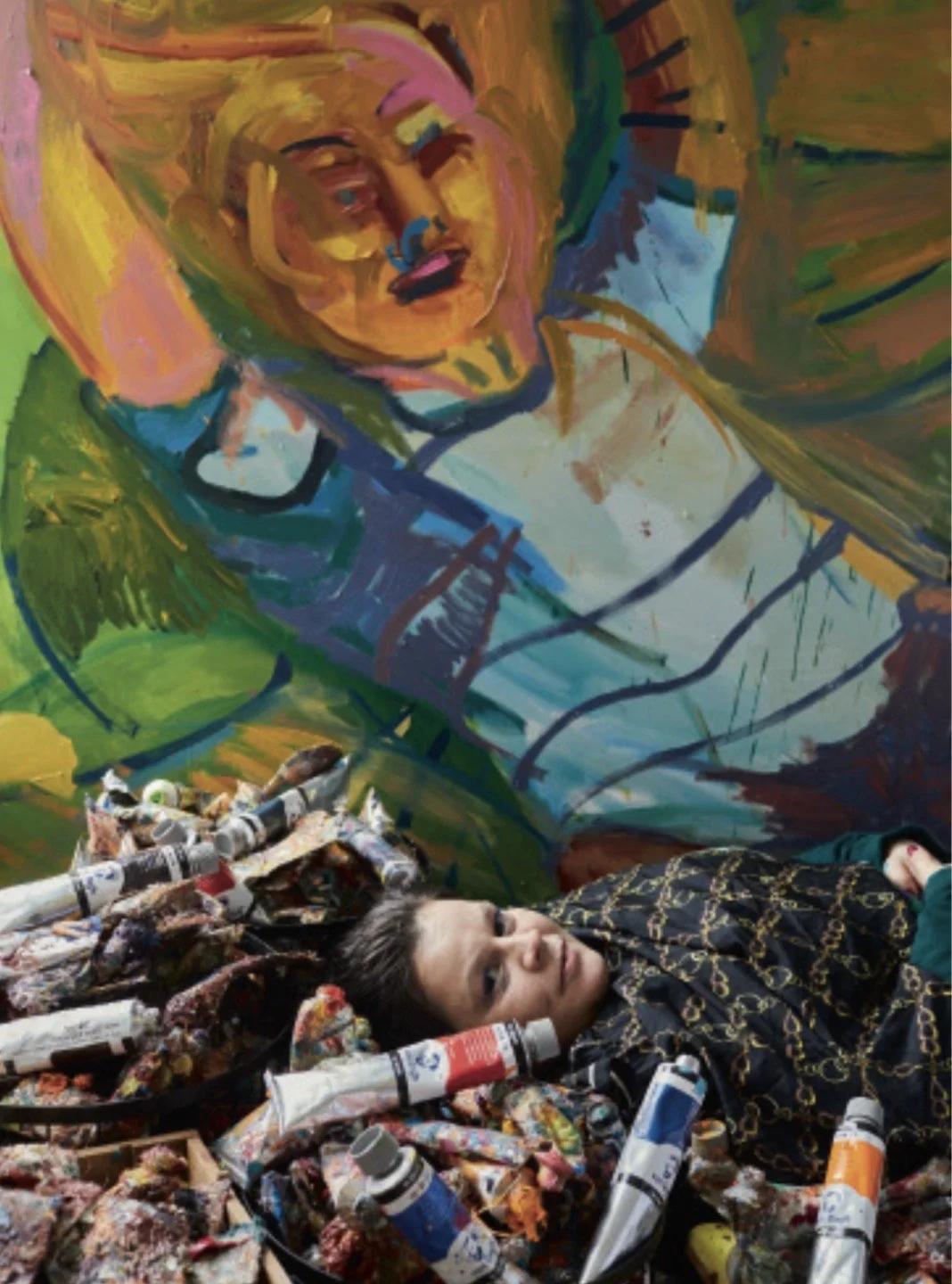Nie dążąc do szczęścia
Mariusz Szczygieł
Najczęściej pisze mi w nocy. W jedną wiadomość wstawia raptem dwa, trzy słowa. Kawał nocy, złożony w jeden tekst ma na przykład taką treść:
„Nie wiem czy mówić o obrazach czy o sobie, powiem ci: może jestem artystka ekstra i światu pokazuję tę stronę. Jak skończyła mi się praca na zmywaku, zaczęłam, tworzyć Instagram i pokazywać swoje obrazy. Ale nie wiem czy pamiętasz cytat z Lyncha, tego reżysera, że rzeczy nie są takie jakie wydają się być, są zawsze ich odwrotnością. Nie jestem z tych, co dążą do szczęścia. Bo to nieosiągalne. Więc nie dążąc do szczęścia, mam się ogólnie spoko, bo akceptuję swoje życie i te gorsze momenty z pokorą. Ale to malarstwo było dla mnie zawsze ucieczką, ostoją, schronem a namalowany obraz dowodem zdrowej duszy. Obraz jest moim świadectwem, że jestem przy zdrowych zmysłach i wszystkie moje ewentualne wichury wewnętrzne i zewnętrzne zostały opanowane. Bo panuję nad płótnem i jeszcze na dwóch nogach stoję wiele godzin ze skupieniem, a nie leżę w depresji. To było zawsze coś, co mi dawało poczucie bycia kimś ważnym, wartościowym. A teraz jestem bliska ucieczki od tego sukcesu. Ja się czuję jak ryba ściśnięta z innymi rybami na talerzu, która zaraz zostanie zeżarta. Jestem, mój drogi, w tej metaforze. Nie u siebie. Zaprosił mnie świat, do którego dążyłam. Bo tak, malarstwo to przepustka do ludzi. A ja mam ich dość. Bardzo chciałam pokazać swoją wartość, ale jestem tym zmęczona”.
Odpisałem: „Tak ciekawie piszesz, że już z tego dałoby się zrobić tekst do tej rubryki”. Ona: „Ale przyjdź, może zaświeci mi słońce”.
Przyszliśmy z Michałem Mutorem, fotografem. Maluje „ćwiczenia z upadania”, obraz za obrazem. Zauważyła, że na ostatnich targach sztuki nie sprzedały się obrazy dosłowne, na przykład upadająca kobieta w garsonce. - Poszły wszystkie upadki niedopowiedziane - mówi. - Ludzie nie chcą widzieć czegoś, nie chcą zobaczyć własnej słabości. Musieliby zdjąć z siebie iluzję. A jak zdejmą, to upadną. Iluzja ich trzyma. Mówię mojemu marszandowi: Panie Bazylko, to chyba trzeba tak sprzedać, jakby się sprzedawało oskubanego kurczaka, ale mówić, że jest opierzony.
- Te ćwiczenia z upadania – dodaje - są o tym, co się z tobą dzieje jak upadniesz? Masz sam z tym sobie poradzić. Tylko sam! A może nie radź sobie, tylko ciesz się, że upadłeś?
Następnej nocy: „Jak coś, to jeszcze pytaj, co i jak z tymi upadkami. Bo sama się gubię. Upaść to też schować się. Zasłonić. Stać się niewidocznym, takie coś mi po naszej rozmowie też wpadło do głowy. Tak pięknie mnie dzisiaj zrobiliście na zdjęciu jako nieboszczkę z farbami po sam grób”.
Monika Misztal
Not Striving for HappinessText by Mariusz Szczygieł
She writes to me most often during the night. One message consists of only two or three words. The entire night of messages condensed into one text, might read something like this:
"I don’t know if I should talk about the paintings or about myself, but I’ll tell you: maybe I’m an extraordinary artist and I’ll show this side of myself to the world. When I finished my dishwashing job, I started creating an Instagram account and showing my paintings. But I’m not sure if you remember the quote from Lynch, the director, that things are not what they seem, they are always their opposite. I’m not one of those who strives for happiness, I think it’s unattainable. So, not striving for happiness, I’m generally fine, because I accept my life and even the the worst parts of it with humility. Painting has always been an escape for me, a refuge, and to me a finished painting is proof of a healthy soul. The painting is a testimony that I’m of sound mind and all my inner and outer turbulences have been restrained. I control the canvas and because of that I still stand focused on my two feet for many hours, instead of lying in a state of depression. Painting was always something that gave me the feeling of being someone important, valuable. Now I feel the need to escape from this success. I feel like a fish squeezed with other fish on a plate, about to be eaten. I am, my dear, in this metaphor. I don’t feel at home. The world I was striving for invited me in. Painting can become a way to connect with people. However, I’ve had enough of them. I really wanted to show my worth, but I’m already tired of it."I reply to her multitude of messages: "You write so interestingly that you could make a literary text for this column out of it." She: "Come visit me anyway, maybe the sun will shine for me."
I arrive together with Michał Mutor, a photographer. She’s painting "Exercises in Falling," one painting after another. She noticed that at the last art fair, literal paintings didn’t sell; for example, a woman falling in a suit. "All the ambiguous works sold," she says. "People don’t want to see something, they don’t want to see their own weakness. They would have to remove the illusion. And if they remove it they will fall. The illusion holds them. I tell my art dealer: Mr. Bazylko, maybe we need to sell the works like we’re selling a plucked chicken, but say it’s feathered."
"These exercises in falling," she adds, "are about what happens to you when you fall? You have to deal with it yourself. Only yourself! Or maybe don’t deal with it, just enjoy the fact that you fell?"
The next night: "If anything, ask again about these falls. Because I’m getting lost myself. Falling is also hiding. Covering up. Becoming invisible, that’s something that came to my mind after our conversation. You took such a beautiful photo of me today, I look like a corpse with paint filling up my grave."

